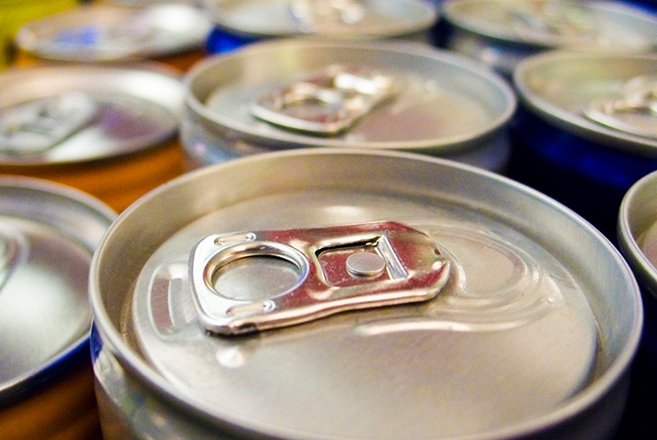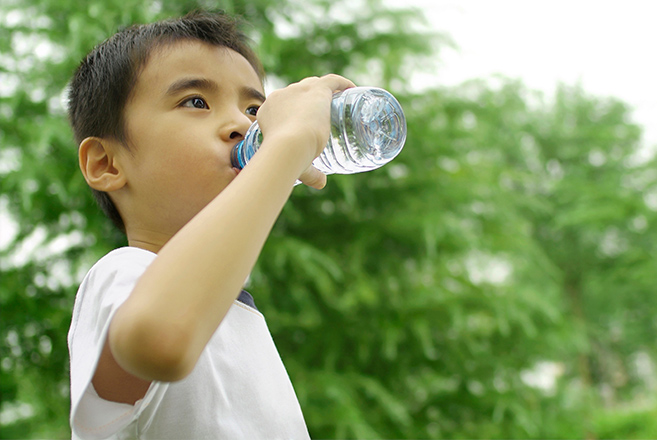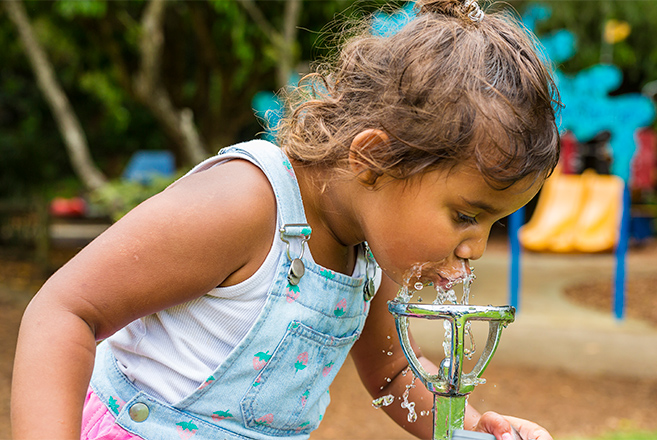
Parents and Caregivers
Drink:
Young infants need only breast milk or infant formula to get enough fluids and proper nutrition.
Avoid:
Infants younger than 6 months should not drink:
- Juice
- Milk
- Flavored milks (e.g., chocolate, strawberry)
- “Transition” or “weaning” formulas (sometimes called toddler milks, growing up milks, or follow up formulas)
- Plant-based/non-dairy milks (e.g., almond, rice, oat)
- Drinks with caffeine (e.g., soda, coffee, tea, energy drinks)
- Low-calorie sweetened drinks (e.g., “diet” or “light” drinks, including those sweetened with stevia, sucralose, or other low-calorie sweeteners)
- Sugar-sweetened drinks (e.g., soda, fruit drinks and fruit-flavored drinks, fruit-ades, sports drinks, energy drinks, sweetened waters, and sweetened coffee and tea drinks)
For an overview of the recommendations, check out these printable resources:
- Healthy Drinks for 0-12 Month Olds
- Summary Recommendations Table (all ages)
- Infographic (Spanish) (Tagalog) (Vietnamese)
- Infographic-Cup Version (Spanish) (Tagalog) (Vietnamese)
Learn more about these different kinds of drinks below and in the report, and in our Q&A.
Drink:
- Infants between 6 and 12 months should still rely on breast milk or infant formula to meet most of their daily nutritional needs. Breast milk and/or infant formula also provide all of the fluids a baby needs during this time.
- Once solid foods are introduced, which is typically around 6 months, try adding in a couple of sips of water during meal times. It helps babies develop cup-drinking skills and learn to like the taste of water, which takes time.
Avoid:
Infants younger than 12 months should not drink:
- Juice
- Milk
- Flavored milks (e.g., chocolate, strawberry)
- “Transition” or “weaning” formulas (sometimes called toddler milks, growing up milks, or follow up formulas)
- Plant-based/non-dairy milks (e.g., almond, rice, oat)
- Drinks with caffeine (e.g., soda, coffee, tea, energy drinks)
- Low-calorie sweetened drinks (e.g., “diet” or “light” drinks, including those sweetened with stevia, sucralose, or other low-calorie sweeteners)
- Sugar-sweetened drinks (e.g., soda, fruit drinks and fruit flavored drinks, fruit-ades, sports drinks, energy drinks, sweetened waters, and sweetened coffee and tea drinks)
These drinks can be big sources of added sugars in young children’s diets and provide no unique nutritional value beyond eating a balanced diet and sticking to water and milk. And, avoiding these kinds of drinks at a young age helps to create and maintain healthy habits down the road.
For an overview of the recommendations, check out these printable resources:
- Healthy Drinks for 0-12 Month Olds
- Summary Recommendations Table (all ages)
- Infographic (Spanish) (Tagalog) (Vietnamese)
- Infographic-Cup Version (Spanish) (Tagalog) (Vietnamese)
Learn more about these different kinds of drinks below and in the report, and in our Q&A.
Drink:
Water
- Children between 12 and 24 months should drink 1 to 4 cups of water daily to get enough fluids.
- The amount of water each child needs might vary from day to day based on how active they are, the weather, or the amount of fluids they get from other beverages like milk or foods like soups and applesauce.
Milk
- Children between 12 and 24 months old can be introduced to plain, pasteurized whole milk, which is full of nutrients such as protein, calcium, and vitamin D that growing bodies need. The recommended amount is 2 to 3 cups per day.
- Whether your one-year-old needs 2 cups or 3 will depend on how much solid food they eat. As children get closer to 2 years and transition to eating more food at mealtimes, they will need less milk.
- If there is a family history of obesity or heart disease, reduced-fat (2%) or low-fat (1%) milk may be considered in place of whole milk, in consultation with your child’s pediatrician.
Limit:
100% Fruit Juice
- Children 12 to 24 months old should drink no more than ½ cup (4 ounces) of 100% fruit juice per day. Adding water to 100% fruit juice can make a little bit go a long way.
- As much as possible, children should meet their daily fruit intake (about 1 cup for 1-3 years and 1½ cups for 4-5 years) by eating fruit in fresh, canned, or frozen forms without added sugars, rather than by drinking juice, as this is the best option.
- If this is not possible, then a combination of whole fruit and 100% fruit juice is okay, as long as a child does not drink more than the upper limit of ½ cup per day.
- This is because juice, even 100% fruit juice, can contribute to dental cavities, and if kids drink more than is recommended, it can have other negative health impacts such as weight gain.
Avoid:
Children 12 to 24 months old should not drink:
- Flavored milks (e.g., chocolate, strawberry)
- “Transition” or “weaning” formulas (sometimes called toddler milks, growing up milks, or follow up formulas)
- Plant-based/non-dairy milks (e.g., almond, rice, oat)
- Drinks with caffeine (e.g., soda, coffee, tea, energy drinks)
- Low-calorie sweetened drinks (e.g., “diet” or “light” drinks, including those sweetened with stevia, sucralose, or other low-calorie sweeteners)
- Sugar-sweetened drinks (e.g., soda, fruit drinks and fruit flavored drinks, fruit-ades, sports drinks, energy drinks, sweetened waters, and sweetened coffee and tea drinks)
Plant-based/non-dairy milks are not recommended as a full replacement for regular milk. Evidence indicates that, with the exception of fortified soy milk, many plant-based/non-dairy milk alternatives lack key nutrients found in cow’s milk. Even when these milks have extra nutrients added to them, our bodies may not absorb those nutrients as well as they can from regular milk. Unsweetened and fortified non-dairy milks may be a good choice if a child is allergic to dairy, lactose intolerant, or is in a family that does not eat dairy products. Be sure to consult with your health care provider when choosing a plant-based/non-dairy milk. It is important to ensure that your child’s diet has the right amounts of key nutrients found in milk, such as protein, calcium, and vitamin D, which are essential for healthy growth and development.
For an overview of the recommendations, check out these printable resources:
- Healthy Drinks for 12-24 Month Olds
- Summary Recommendations Table (all ages)
- Infographic (Spanish) (Tagalog) (Vietnamese)
- Infographic-Cup Version (Spanish) (Tagalog) (Vietnamese)
Learn more about these different kinds of drinks below and in the report, and in our Q&A.
Drink:
Water
- Children 2 to 3 years old should drink 1 to 4 cups of water daily to get enough fluids.
- The amount of water each child needs might vary from day-to-day based on how active they are, the weather, or the amount of fluids they get from other beverages like milk or foods like soups and applesauce.
Milk
- Children 2 to 3 years old should transition to plain, pasteurized fat-free (skim) or low-fat (1%) milk. The recommended amount is up to 2 cups a day.
- Transitioning to lower-fat milks helps children stay within recommendations for total daily calorie and fat intake, which helps promote a healthy weight. However, if your child is underweight or has other medical needs, consult with your health care provider to choose the best beverages for your child.
Limit:
100% Fruit Juice
- Children 2 to 3 years old should drink no more than ½ cup (4 ounces) of 100% juice per day. Adding water to 100% fruit juice can make a little bit go a long way.
- As much as possible, children should meet their daily fruit intake (1 cup for 1-3 years and 1½ cups for 4-5 years) by eating fruit in fresh, canned, or frozen forms without added sugars, rather than by drinking juice, as this is the best option.
- If this is not possible, then a combination of whole fruit and 100% juice is okay, as long as a child does not drink more than the upper limit of ½ cups per day.
- This is because juice, even 100% fruit juice, can contribute to dental cavities, and if kids drink more than is recommended, it can have other negative health impacts such as weight gain.
Avoid:
Children 2 to 3 years old should not drink:
- Flavored milks (e.g., chocolate, strawberry)
- “Transition” or “weaning” formulas (sometimes called toddler milks, growing up milks, or follow up formulas)
- Plant-based/non-dairy milks (e.g., almond, rice, oat)
- Drinks with caffeine (e.g., soda, coffee, tea, energy drinks)
- Low-calorie sweetened drinks (e.g. “diet” or “light” drinks, including those sweetened with stevia, sucralose, or other low-calorie sweeteners)
- Sugar-sweetened drinks (e.g., soda, fruit drinks and fruit flavored drinks, fruit-ades, sports drinks, energy drinks, sweetened waters, and sweetened coffee and tea drinks)
Plant-based/non-dairy milks are not recommended as a full replacement for regular milk. Evidence indicates that, with the exception of fortified soy milk, many plant-based/non-dairy milk alternatives lack key nutrients found in cow’s milk. Even when these milks have extra nutrients added to them, our bodies may not absorb those nutrients as well as they can from regular milk. Unsweetened and fortified non-dairy milks may be a good choice if a child is allergic to dairy, lactose intolerant, or is in a family that does not eat dairy products. Be sure to consult with your health care provider when choosing a plant-based/non-dairy milk. It is important to ensure that your child’s diet has the right amounts of key nutrients found in milk, such as protein, calcium, and vitamin D, which are essential for healthy growth and development.
For an overview of the recommendations, check out these printable resources:
- Healthy Drinks for 3-4 Year Olds
- Summary Recommendations Table
- Infographic (Spanish) (Tagalog) (Vietnamese)
- Infographic-Cup Version (Spanish) (Tagalog) (Vietnamese)
Learn more about these different kinds of drinks below and in the report, and in our Q&A.
Drink:
Water
- Children 4 to 5 years old should drink 1.5 to 5 cups of water a day.
- The amount of water each child needs might vary from day-to-day based on how active they are, the weather, or the amount of fluids they get from other beverages like milk or foods like soups and applesauce.
Milk
- Children 4 to 5 years old should drink plain, pasteurized fat-free (skim) or low-fat (1%) milk. The recommended amount is up to 2.5 cups a day.
Limit:
100% Fruit Juice
- Children ages 4 to 5 years old should drink no more than ½ – ¾ cup (4-6 ounces) of 100% juice per day. Adding water to 100% fruit juice can make a little bit of juice go a long way.
- As much as possible, children should meet their daily fruit intake (1 cup for 1-3 years and 1½ cups for 4-5 years) by eating fruit in fresh, canned, or frozen forms without added sugars, rather than by drinking juice, as this is the best option.
- If this is not possible, then a combination of whole fruit and 100% juice is okay, as long as a child does not drink more than the upper limit of ¾ cups per day.
- This is because juice, even 100% fruit juice, can contribute to dental cavities, and if kids drink more than is recommended, it can have other negative health impacts such as weight gain.
Avoid:
Children 4 to 5 years old should not drink:
- Flavored milks (e.g., chocolate, strawberry)
- “Transition” or “weaning” formulas (sometimes called toddler milks, growing up milks, or follow up formulas)
- Plant-based/non-dairy milks (e.g., almond, rice, oat)
- Drinks with caffeine (e.g., soda, coffee, tea, energy drinks)
- Low-calorie sweetened drinks (e.g. “diet” or “light” drinks, including those sweetened with stevia, sucralose, or other low-calorie sweeteners)
- Sugar-sweetened drinks (e.g., soda, fruit drinks and fruit flavored drinks, fruit-ades, sports drinks, energy drinks, sweetened waters, and sweetened coffee and tea drinks)
Plant-based/non-dairy milks are not recommended as a full replacement for regular milk. Evidence indicates that, with the exception of fortified soy milk, many plant-based/non-dairy milk alternatives lack key nutrients found in cow’s milk. Even when these milks have extra nutrients added to them, our bodies may not absorb those nutrients as well as they can from regular milk. Unsweetened and fortified non-dairy milks may be a good choice if a child is allergic to dairy, lactose intolerant, or is in a family that does not eat dairy products. Be sure to consult with your health care provider when choosing a plant-based/non-dairy milk. It is important to ensure that your child’s diet has the right amounts of key nutrients found in milk, such as protein, calcium, and vitamin D, which are essential for healthy growth and development.
For an overview of the recommendations, check out these printable resources:
- Healthy Drinks for 4-5 Year Olds
- Summary Recommendations Table (all ages)
- Infographic (Spanish) (Tagalog) (Vietnamese)
- Infographic-Cup Version (Spanish) (Tagalog) (Vietnamese)
Learn more about these different kinds of drinks below and in the report, and in our Q&A.
Learn more about different kinds of drinks.
Water
Unflavored, unsweetened, uncarbonated, fluoridated drinking water. Plain water is the best way to quench your child’s thirst. It’s great for snack time, meal time, or anytime!
- Infants younger than 6 months only need breast milk (Spanish) (Tagalog) (Vietnamese) or infant formula to get enough fluids.
- For infants 6 to 12 months old, offer small sips of water when feeding solid foods to help babies develop cup-drinking skills and learn to like the taste of water, which takes time. This small amount of water (about 4-8 ounces total for the day) is not intended to replace any amount of breast milk or infant formula, since those provide all the fluids a baby needs at these ages.
- Children 1 to 3 years of age should drink 1-4 cups of water daily while those 4 to 5 years of age should drink 1.5 to 5 cups a day.
These large ranges reflect individual needs of children based on how active they are, where they live, the weather, etc.
Learn more! Download “All About Water” factsheet. (Spanish) (Tagalog) (Vietnamese)
Milk
Plain, pasteurized cow’s milk with no added caloric sweeteners, low-calorie sweeteners, or flavorings. Common varieties include whole milk (also known as Vitamin D milk), reduced fat (2%), low-fat (1%), and skim (fat-free).
- Infants less than 12 months old should not drink milk.
- Children 12 to 24 months old can be introduced to plain, pasteurized whole cow’s milk. If there is family history of obesity or heart disease, reduced-fat (2%) or low-fat (1%) milk may be considered in consultation with a pediatrician. The recommended amount is 2-3 cups a day.
- At 2 years of age, children should transition to plain, pasteurized fat-free (skim) or low-fat (1%) milk. The recommended amount is 2 cups a day for children ages 2-3 and up to 2.5 cups a day for children ages 4-5.
Serve milk from a cup, and only during meals or snacks. If your child carries around a sippy or covered cup during other times of the day, water is the best drink to have in it. That’s because drinks that have sugars, whether natural (like the ones in milk) or added (like the ones in sodas), can increase risk of cavities when they are in frequent contact with the teeth between meals and snacks.
Learn more! Download “All About Milk” factsheet. (Spanish) (Tagalog) (Vietnamese)
Juice
A beverage made from the natural liquid found in fruits or vegetables. 100% juice means that everything in the container came from a fruit or vegetable with no added sugars or other ingredients.
- Infants less than 12 months old should not consume juice.
- Children ages 1-3 should consume no more than ½ cup (4 ounces) of 100% juice per day.
- Children ages 4-5 should consume no more than ¾ cup (6 ounces) of 100% juice per day.
These amounts are upper limits, not minimum requirements.
When possible, children should meet their daily fruit intakes (about 1 cup for ages 1-3 and 1½ cups for ages 4-5) through whole fruits in fresh, canned, or frozen forms, without added sugars, instead of by drinking 100% juice. If this is not possible, a combination of whole fruit and 100% juice is okay.
If you offer 100% juice, serve it from a cup, and only during meals or snacks. If your child carries around a sippy or covered cup during other times of the day, water is the best drink to have in it. That’s because drinks that have sugars, whether natural (like the ones in 100% juice) or added (like the ones in sodas), can increase risk of cavities when they are in frequent contact with the teeth between meals and snacks.
Learn more! Download “All About Juice” factsheet. (Spanish) (Tagalog) (Vietnamese)
Other Beverages
All children 5 and under should avoid drinking:
- Plant-based/non-dairy milks*: Download “All About Plant Milks” factsheet to learn more. (Spanish) (Tagalog) (Vietnamese)
- Flavored milk: Download “All About Milk” factsheet to learn more. (Spanish) (Tagalog) (Vietnamese)
- Toddler milk: Download “All About Toddler Milk” factsheet to learn more. (Spanish) (Tagalog) (Vietnamese)
- Low-calorie sweetened drinks: Download “All About Low-Calorie Sweetened Drinks” factsheet to learn more. (Spanish) (Tagalog) (Vietnamese)
- Sugar-sweetened drinks, including fruit drinks: Download “All About Sugar-Sweetened Drinks/Fruit Drinks” factsheet to learn more. (Spanish) (Tagalog) (Vietnamese)
- Drinks with caffeine.
*Unsweetened and fortified plant-based milks may be a good choice if a child is allergic to dairy, lactose intolerant, or does not eat dairy products. Be sure to consult with your health care provider to choose the right milk substitute to ensure that your child is still getting adequate amounts of the key nutrients found in milk, such as protein, calcium, and vitamin D, which are essential for healthy growth and development.



